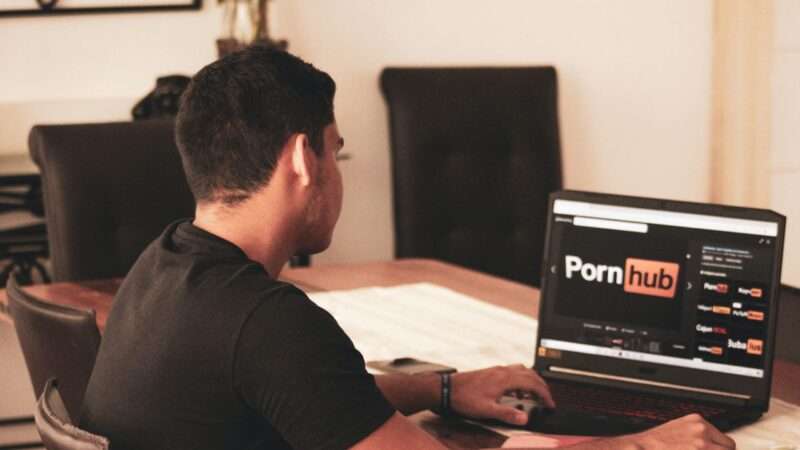
Last weekend's deplatforming of Kiwi Farms, an internet forum known for encouraging the doxxing and harassment of disfavored figures, has brought the eternal question of online content regulation once again to the fore. In this case, the deplatforming was a private business decision by Cloudflare, a web services provider, following a pressure campaign led by trans activists. But a government takedown of the site would have had fans, too. Rep. Marjorie Taylor Greene (R–Ga.), who was swatted by a Kiwi Farms user, argued that it is a "failure of our government and failure of our law enforcement to not take down a website like that," "all of these types of groups need to be completely eradicated," and "they should not be allowed to exist."
Greene's remarks were brief and primarily concerned with attacking Democrats. But even if she'd spoken longer, my guess is she would have omitted a topic almost always ignored by proponents of banning objectionable content online: Enforcement.
That would be an issue with any plan for government content regulation, especially in forum-style sites like Kiwi Farms with a large base of users creating content, but this glaring absence is most obvious in proposals for banning pornography. I've read a lot of these proposals, researching the idea for a chapter I contributed to a forthcoming book on the digital public square. Almost universally, they don't discuss enforcement.
Senate candidate J.D. Vance (R–Ohio), for example, has endorsed the idea of a complete porn ban, but to my knowledge, he hasn't elaborated on enforcement at all. Former First Things senior editor Matthew Schmitz's 2016 case in The Washington Post for banning porn likened it to "bans" on murder and rape, which raises the specter of prison time, but he lets the implication slip away without explicit comment.
A 2019 First Things suggestion of digital "zoning"—say, by limiting all porn to regulated .xxx domains—says "all pornography and indecent material that showed up outside the zone (for example, on a website with a .com or .org domain) could be deemed illegal and referred to the DOJ for prosecution." But it doesn't say who's doing those referrals and what consequences the prosecution should bring. Likewise, a contemporary argument from The Daily Wire's Matt Walsh for "much heavier regulation" or an outright ban of online porn is long on rationale but silent on enforcement.
A 2021 piece at National Review seeks to ban only free online porn and delves into constitutionality in a way the Schmitz article does not. But it too is silent on enforcement mechanisms. And an article published this past June at Fox News contends "it is time to tear down the virtual porn theaters" but devotes no space to explaining how this would be done or what punishment violators should face.
In other proposals, it's all more of the same. The only porn regulation proposal which reliably comes with any discussion of enforcement is increased prosecution of obscenity laws already on the books, as advocated most prominently in a 2019 letter to the Justice Department from several members of Congress. Obscenity, in constitutional jurisprudence, is a far narrower category than the average non-lawyer would suppose. Yet even if this plan had a wider application, it's still not clear how reviving the Obscenity Prosecution Task Force, as the lawmakers seem to want, would work in practice—and that brings us to the crux of the enforcement question.
In its original incarnation, from 2005 to 2011, the task force prosecuted producers and distributors of obscenity. I suspect this distinction, borrowed from the drug war, is what many would-be prohibitionists of online pornography and other objectionable content have in mind: Go after the dealers, not the users.
But that division is not so neatly drawn when it comes to online content (and drugs, but that's another point for another day). You can take down the big targets, the Pornhubs and Kiwi Farms of the world, easily enough. Maybe you toss their owners in jail or hit them with big fines.
But when their erstwhile users make a new site, or a thousand new sites—and they will—will they all get taken down too? Will you get everyone who uploads a video or leaves a comment? Everyone whose internet history shows they've visited these sites? What about emailing the banned content to download for offline viewing—is that illegal too? What kind of mass surveillance apparatus are you willing to build to catch everyone who bypasses the ban?
And if you catch them, what then? Would the government fine people? Garnish their wages? Put them on a sex offender registry? Take away their children?
Would we imprison people over pornography? For how long? (Remember, we're talking about a ban on all porn or other objectionable but currently legal content, not already and rightly illegal things like child pornography, nonconsensual pornography, or the swatting to which Greene was subjected.) Is a family better off if the dad gets three strikes and goes to prison for a year and can't find a job when he gets out? Will putting a young man addicted to pornography in the criminogenic environment of prison make him more or less likely to get his life on track?
None of this is to suggest porn is a good thing or that I'm sorry to see Kiwi Farms go. I believe pornography is evil, and from what I know of Kiwi Farms, good riddance. But as Yale law professor Stephen L. Carter observed in 2014, "making an offense criminal" doesn't simply show "how much we care about it." Ultimately, every ban creates the possibility "that the police will go armed to enforce it."
Don't get squeamish, prohibitionists. Tell us what stick you have in mind. Content ban plans can't be taken seriously until you explain what, exactly, you want the state to do to people who break your rules.
The post Everyone Wants To Ban Certain Content Online. No One Wants To Talk Enforcement. appeared first on Reason.com.







